Choosing the Right Point of Sale (POS) System for your Retail Business
Point-of-Sale systems (POS) have become a “must-have” for any retail store trying to reach the next level in their Line-of-Business. More than twenty (20) years ago, cash registers were used to manage sales. Increasing customer choices and product varieties over the past several decades have demanded more sophisticated electronic options to allow stores to reconcile their stock and transactions automatically.
With the technology boom, Electronic Cash Registers (ECR) — later termed Point-of-Sale systems — have become this option, expanding beyond the transaction register to cloud-based POS applications that allow complete control over multiple global retail lines. Product inventory and sales can be controlled and monitored from any location seamlessly and with full transparency. A simple POS terminal can increase sales exponentially for any retail business by processing customers fast and providing multiple payment options.
For every retailer, selecting the best POS system for their business is a top priority. A few features that every POS should have are:
- Stock Visibility — keeping track of product movement can help retailers avoid stock-outs or dead stocks and thus improve customer relationships. A right POS should also keep track of inventory at other branches and provide continuous insights on product sales.
- Routing the Branch — keeping customers happy with an eCommerce POS option to process a sale at a different branch (if the product is not available in one department) is an excellent customer satisfaction strategy.
- Real-time reporting — the option to generate real-time business reports, based on product sales and inventory data, is one of the key features that every multi-store retailer needs. These reports can also help businesses get rid of extraneous costs.
- Multichannel Customer Experience — retailers who manage online stores along with physical stores should have the option in their POS system to provide the same consistent product and pricing information to their customers, whether online or onsite.
- Integration with 3rd Party Apps — businesses using POS systems need to make their data available to their ERP and accounting applications. With open API’s, these POS systems can allow integration platforms like DBSync to share the data with various other apps securely, thus avoiding double data entry.
- Loyalty Programs — with the smartphone era, modern POS systems are implementing loyalty programs more than ever to keep customers engaged. Customers can download the app instead of swiping or punching cards, to keep track of their purchases and earn reward points. This helps retailers keep track of their customers’ purchases and allow them to serve them better.
- Data security — data must be kept secure at all ends. Customer buying patterns and personal info is much more of a concern nowadays. A proper compliance POS system allows retailers to protect customers’ privileges and gain their trust and loyalty.
Several additional factors to consider when selecting a POS are cost, ease of use, and longevity. For multi-channel retailers who sell online and in physical spaces, applications like Shopify POS and Vend meet the above criteria. These POS applications not only allow retailers to manage sales, they even help in doing multichannel eCommerce by connecting to various eCommerce channels like Amazon, Big Commerce, and Walmart, thus increasing their presence around the globe. Moreover, these applications allow integration with various 3rd party applications for shipping and accounting process with the help of open API’s. DBSync, a pioneer in the field, allows for seamless integration, providing complete control over the business and optimizing sales.
Retailers must adhere to specific standards when selecting POS systems, keeping in mind that the perfect marriage of POS with eCommerce is the key to running a successful retail business in the future.
